You might think salt makes you bloated. It's actually something else. We hear all the…

Fasting for Weight Loss: What Does the Science Say?
Table of Contents
- Why is everyone suddenly talking about fasting and intermittent fasting for weight loss?
- The Who’s Who of Fasting
- The Grand Dame of Fasting Research
- Is Fasting Dangerous?
- What Does Intermittent Fasting Mean?
- What does Time Restricted Eating mean?
- How Much Weight Can You Lose With Fasting?
- Does Fasting Beat Calorie Restriction for Weight Loss?
- Most Diets Cause Lean Mass Loss. Is Intermittent Fasting SAFER?
- Does Intermittent Fasting Improve METABOLIC Health Versus Calorie Restriction?
- How Does Intermittent Fasting Affect HORMONES Compared to Calorie Restriction?
- Is Time Restricted Eating Better than Intermittent Fasting for Weight Loss?
- A Potential Problem With Extended Fasts
- What’s My Takeaway?
- RELATED VIDEOS
This article will review the fasting and weight loss topics and questions listed in the TOC above.
Why is everyone suddenly talking about fasting and intermittent fasting for weight loss?
Whenever a new weight loss tool becomes available, it has to run the gauntlet of opinionated people who either love it or hate it. The people who’ve hated on intermittent fasting warn that it’s a setup for binge eating disorders and distorted food relationships. The people who’ve loved it and promoted it claim that it’s the final solution for weight loss that’s safer and more effective than standard methods, namely calorie restriction.
But if you are trying to decide if you want to try fasting to lose weight, you probably don’t appreciate the controversy. You’d probably like to know who is right and who is wrong? Or is the truth simply somewhere in between?
This article is continued below...(scroll down)
Fortunately, science helps sort this out. I’ve packed the best science into this article. I’m going to highlight the benefits of fasting, but keep them grounded in reality. I’m also going to address some of the safety concerns.
And first, I want to drop some names. Who deserves credit for creating the buzz around this new weight loss strategy? And who deserves credit for actually studying it?
The Who’s Who of Fasting
I’ve been watching this trend since its inception, and here’s my perspective on key personnel.
At first, pretty much no one in the nutrition world mentioned fasting.
Then, in 2010, Mark Sisson popularized the term “intermittent fasting” with his blockbuster book, Primal Blueprint. The idea was that our primal ancestors would go through periods of fasting and feasting, and maybe we should too. Not necessarily for weight loss, but rather for optimal health. By not eating for a day or so while still being active and searching for food, our ancestors were burning off plenty of body fat on a regular basis. In the past, living on stored body fat for a day or so would have appetite-suppressant and energizing effects for a variety of reasons that have to do with hormones and metabolism. (These metabolic benefits may be less available today, unfortunately, see below.)
A couple of years later, Dr. Jason Fung realized how easy it was to tell his diabetic patients “just don’t eat” compared to teaching them how to count carbs. He reasoned fasting ought to be safe since so many people fast for religious reasons with zero medical input. So he tried it out, working closely with people to cut insulin and other med dosages on their fasting days. He found that many lost weight and were able to reduce their reliance on insulin and other medications in the longer term. Super cool.
Both of these thought leaders deserve credit for thinking outside the box and for emphasizing short-term fasting instead of extended fasting. (See Extended Fast discussion, below).
The Grand Dame of Fasting Research
The scientist who has most thoroughly evaluated the safety and effectiveness of intermittent fasting is Dr. Krista Varady. She has done more research on intermittent fasting than anyone else, having started way back in 2005. Since then, Dr. Varady has published hundreds of papers on the subject and her clinical trials have involved well over 1000 people.
Even though this is still a tiny niche area in the field of weight loss, we do have enough science to address some of the most important questions.
One unfortunate thing about all fasting research is that the study designers are trapped in the AHA nutrition paradigm that promotes more vegetable oil. This means that almost everyone in these studies is still following the unhealthy, standard American diet full of polyunsaturated fatty acids, which damage mitochondria. If you want to learn more about a traditional, whole-food-based diet, visit this page.
Is Fasting Dangerous?
Most of the people raising concerns that fasting might be dangerous are thinking of eating disorders. Some people with eating disorders essentially fast and binge. And the worry is that promoting this pattern as a weight loss tool will feed into that kind of problem.
I think that’s a valid concern. And I have two responses to it.
First, studies on fasting are carefully designed. Part of the process involves getting input from a human safety board. These folks were no doubt involved in the early studies back in 2005, and that question would no doubt have been raised. No doubt people with eating disorders were excluded from some studies, too. But here we are with thousands of people who’ve now gone through these studies, and if it created eating disorders, I’m fairly confident that would have been detected.
Still, this is obviously not a good weight-loss strategy for someone with an active eating disorder. In fact, weight loss is probably not a good idea for people with eating disorders until they’re comfortably recovered.
Secondly, the world is full of bad ideas for this or that group of people. We can’t protect everyone all the time.
I don’t think short-term fasting is dangerous. Long-term fasting is another creature altogether and might be a good topic for a future article.
So, before we jump any further into the science of intermittent fasting and time-restricted eating, let’s define our terms.
What Does Intermittent Fasting Mean?
Intermittent fasting is an umbrella term that includes various regimens of not eating or drinking anything with calories. These fall into two categories, fasting, and time-restricted eating.
Fasting means…
Fasting used to mean not eating for a day, or longer. But lately, the term has been used somewhat more loosely. These days the term more often refers to a day of restricting calories by 60 percent or more, rather than a full 24 hours of not eating.
Why? It turns out that it’s not really easy to fast. Dr. Varady explains that when her studies include a full 24 hours of fasting, many people dropped out because they got too hungry! So she and several of the other researchers now allow people to eat on their fast days. Just a little. Somewhere between 300 and 500 calories, and often that’s in a restricted time period, like 12 noon to 2 pm.
These intermittent fasting regimens vary quite a bit. But the most well-studied are Krista Varady’s own. She uses two, which she calls an alternate day fast and a 5/2 fast.
Alternate day fasting (abbreviated ADF) usually allows people to eat as much as they want one day, and the next is restricted—as mentioned. The eating day is often called the feasting day. And the fasting day usually requires counting calories to make sure not to exceed a limit. Or, you could simply allow eating in a very narrow timeframe. Or both.
The 5/2 fast is simply eating as much as you want for 5 days, and fasting for 2 days. Here again the 2 days of “fasting” often include up to about 500 calories.
What does Time Restricted Eating mean?
Time-restricted eating (TRE) is a method of intermittent fasting that allows you to eat as much as you want every day, but only in a certain window of time. The most popular timeframe is 12 to 8. This allows people to socialize like normal.
Ok now onto the science of fasting!
How Much Weight Can You Lose With Fasting?
The answer depends on how many calories your fasting regimen cuts. The more calories you cut, the more weight you lose. Dr. Varady summarizes her experience as follows:
Most people following an 8-hour eating window will cut out around 2-300 calories each day and lose about 2-3 percent of their body weight.
Most people following a 4-6 hour eating window will cut out more calories, 3-500, and lose about 5-10 percent of their weight.
Alternate-day fasting is about the same as the 3-6 hour window.
Most studies show that you need to lose at least 5 percent of your body weight to see improvements in biomarkers. But here again, this is within the AHA diet paradigm. I disagree with the AHA’s nutrition paradigm and no longer follow it. In my experience, when people cut out seed oils, multiple biomarkers improve. Weight loss is just the icing on the cake.
Does Fasting Beat Calorie Restriction for Weight Loss?
To answer this question, we need studies directly comparing intermittent fasting to calorie-restriction. As of 2019, 11 such studies existed in the literature. According to a paper that reviewed all of them, the answer was no.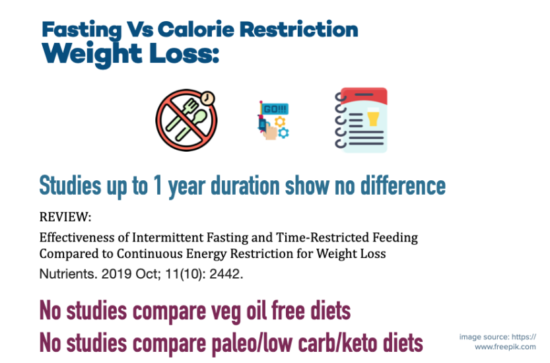
Let’s take a closer look at one of the largest and most well-designed. This study compares alternate-day fasting with daily calorie restriction. Two groups of dieters restricted calories by the same amount, just in different timeframes. The daily calorie restriction group got 3 meals that created a 25 percent calorie deficit every day. The alternate-day fasting group ate an excess of calories on nonfasting days, and a deficit on fasting days. Over the two days, the average calorie restriction was 25 percent for this group, too.
A Well-Designed Study of Fasting for Weight Loss
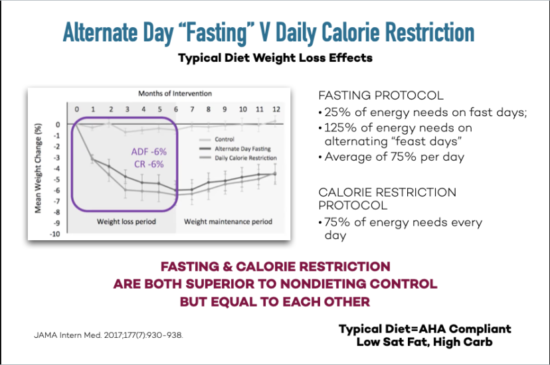
The result was pretty much in alignment with what you would predict based on the calorie deficit, according to Dr. Vardy. Both groups lost equal amounts of weight over the first 3 months. That was the weight-loss phase. The next three months represented the maintenance phase. In this phase, the time-restricted group got more hours per day to eat, and the calorie-restriction group got the number of calories calculated to maintain each person’s weight loss. Interestingly, both groups regained equal amounts of weight in the same time frame.
One reason this study was so well designed is that both groups ate the same type of diet, meaning we’re comparing apples to apples, so to speak. The only difference is the timing; when calories got ingested.
Unfortunately, the study was funded by the American Heart Association. So both groups got almost exclusively vegetable oil as their source of fat. This is true for most studies and is such a problem for human health that I think it’s important to point it out every time.
You’ll notice the weight loss period was only three months. This is apparently pretty typical for weight loss studies because after three months most people stop losing weight and start to plateau. It’s so predictable that Dr. Varady suggested to a podcast audience of dietitians that, if they’ve recommended a diet to someone but there’s no weight loss after three months, it’s not going to happen with that strategy. I thought that was a very interesting observation.
Most Diets Cause Lean Mass Loss. Is Intermittent Fasting SAFER?
When we lose weight, we want to lose our excess body fat and keep everything else. But daily calorie restriction diets also cause most people to lose a good deal of their lean tissues, including muscle, bone, and even vital organs.
Quite a bit, too. For every 4 pounds of body weight, you lose, 3 come from body fat and 1 come from lean tissue. This is bad. It’s a problem that demands a solution. Unfortunately, obesity researchers have no idea what to do or why it’s happening.
If you never heard about the loss of important body structures from dieting before, you’re not alone. It seems like nobody in the weight loss industry wants people to know about this, and I almost never hear anyone bringing it up. So, here’s a reference and a link to a snippet where Dr. Varady explains that is her experience, too.
One Potentially Dangerous Claim About Fasting
Not long ago, I attended a lecture on fasting by a speaker who claimed to have the solution to this problem of lean mass loss during weight loss. Fasting. But the speaker promoted multi-day fasts and claimed fasting was safer than calorie restriction because it did not cause lean mass loss. The single piece of data the presenter cited was quite short—less than a week!—and less than a dozen people participated. This was not adequate data.
That’s why, after the lecture, I challenged the presenter. My question was “How do you know that your patients aren’t losing bone density or even brain tissue during these extended fasts?” The presenter admitted that at this point there was no safety data.
I left the lecture not at all convinced that multi-day fasts were the solution. Multiple rounds of multi-day fasts in a short timeframe could cause serious detrimental effects on vital organs. Particularly in people with metabolic problems.
What does the data say about this important issue?
Well, there’s very little data to go on. But one study in mice seemed to suggest that fasting might be a solution.
The Mouse Study That Changed the Conversation
This study has been cited repeatedly as evidence that fasting preserves lean mass. When it first came out, I thought that’s what it showed, too. But there was something important that I hadn’t noticed. It was not actually a weight-loss study!
The scientist who designed the study had an idea about circadian rhythms and metabolic health. Mice normally only eat at night, when its dark. In high-fat feeding experiments, we provide them access to food 24/7. He noticed in his own earlier studies that mice with access to food all the time had dampened circadian rhythms. He wondered if that might be messing up our high-fat feeding studies. As stated in the paper, his experiment probed the question of whether “obesity and metabolic diseases result from HFD or disruption of metabolic cycles.” So he cut down their feeding window from 24 to just 8 hours and only provided them food in the dark.
In other words, it was designed to figure out whether a high-fat diet makes lab mice fat, or if it’s that researchers were feeding them at the wrong time.
It’s an important question and he was among the first to ask.
Was It Really Designed For Mouse Researchers?
I doubt the study was ever intended to be extrapolated to humans. The paper states that “disruption of the diurnal rhythms is commonly found in animal models of diabetes and obesity.” It seems to have been seeking a better animal model of obesity.
I thought the study was fascinating because it was exploring something new: the effect of circadian rhythm on weight. It also presented a mystery: why would feeding mice high-fat chow day and night make them so fat? But after learning more about normal mouse diets, when I read through it again, more carefully, I realized there is no mystery at all.
I hadn’t realized that all mice fed a high-fat diet have access to as much food as they want all of the time. Not a set amount. If you only provide high-fat food during an 8-hour feeding window, the mice don’t have as much opportunity to eat and there’s less disruption to their sleep cycle. With more normal sleep, they’ll be less stressed, more active during the day, and burn more calories.
The study is not just about time-restricted eating, it’s also about sleep deprivation in a typical lab setting. That’s what made me think the study may have been designed purely to help other researchers do mouse studies better. Not for human consumption, so to speak.
The Most Interesting Part of the Mouse Study
The graph labeled H in this figure may be where much of the mystique of time-restricted feeding for weight loss originates. It shows that the time-restricted eating (TRE) mice did not get as fat as the ad-lib mice but still had normal lean body mass. Some have used this to suggest that TRE and fasting might preserve lean mass during weight loss. But these TRE mice had never gained weight, so they didn’t need to lose it either.
Because mice and humans have very different normal diets, feeding behaviors, and metabolic rates, extrapolating from mouse studies to human studies in this particular field of investigation may not be wise. According to Dr. Varaday, “Fasting a mouse for 16 hours is probably like fasting a human for a week.” And there’s no need to use mice.
Why do animal studies at all? Animal studies are helpful for experiments that involve tests that you can’t do on people. Changing eating schedules and seeing how it affects weight is best suited for human studies.
The Body Composition Study That Might Reground The Fasting Conversation
Below, I’m presenting the data from the first human study to address this question of body composition. It shows that there is no clear advantage to adjusting the timing of meals. The slide shows that, on average, the intermittent fasting group lost less lean mass, but they also lost less fat mass. Neither of these differences was statistically significant.
Since then, a second study designed to answer the question has shown similar results; fasting does not preserve lean mass compared to regular-old calorie restriction.
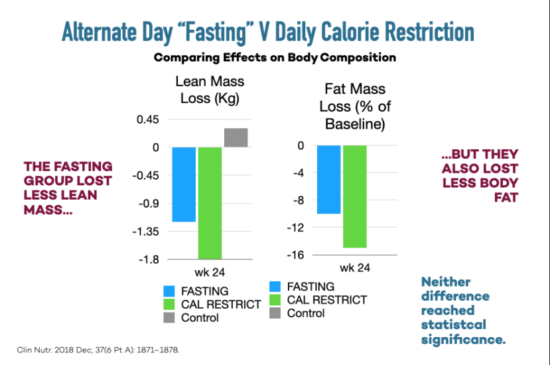
Does Intermittent Fasting Improve METABOLIC Health Versus Calorie Restriction?
Many studies on intermittent fasting show that it improves a variety of metabolic markers, including insulin, glucose, blood pressure, waist circumference, and inflammation markers. And these studies are well done. But what I see all too often is a failure by media reporting on these studies to point out that any old diet that produces weight loss also produces all these same changes. In fact, one scientist followed an all-junk food but calorie-restricted diet to make the point that calorie restriction alone moves some of these biomarkers!
The studies we want to focus on are designed to answer this question: How does intermittent fasting perform compared to calorie restriction? Is it better, worse, or the same?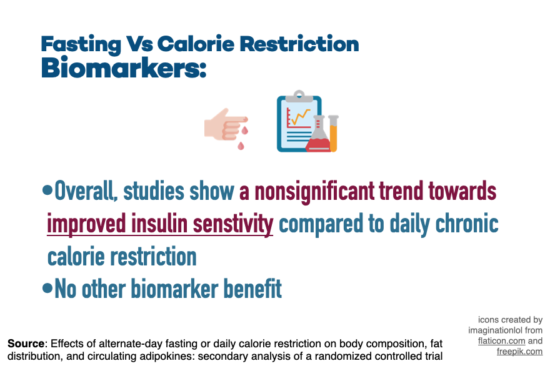
We now have a couple of meta-analyses designed to sort this out. So far, intermittent fasting appears to improve insulin sensitivity ever-so-slightly more than calorie restriction. A majority of studies showed zero difference, but about ten percent of them showed a small but meaningful and significant difference.
Why would this be?
We don’t know yet but there are two ideas. If it’s related to going longer between meals, then there may be a therapeutic effect from “resting” the gut, or from keeping insulin low enough for long enough to start generating ketones. Or both. It could be related to other dietary variables that were not tracked, of course.
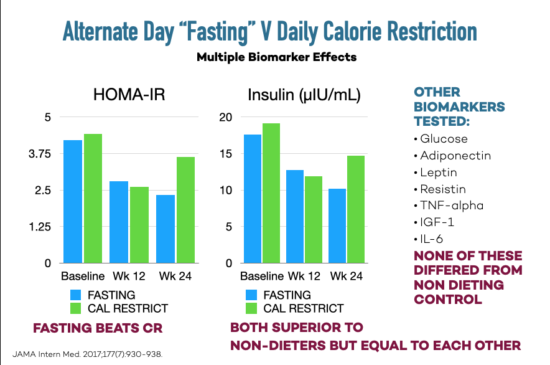
What about other biomarkers? So far none of the studies have shown intermittent fasting outperforming calorie restriction in any other realm. The slide above shows typical results. It also details the other biomarkers studied.
How Does Intermittent Fasting Affect HORMONES Compared to Calorie Restriction?
Typical weight loss strategies tend to boost testosterone levels in overweight and obese men. This is a good thing because men with overweight or obesity often have low T. But this observation is based on very limited data. A 2021, meta-analysis, found only 4 studies in the entire English language medical literature. Interestingly, the same review showed weight loss reduces testosterone in normal-weight men.
The data on the effects of fasting is even more limited. The study below shows, contrary to the above, that fasting reduces testosterone in obese men and women. This may be good for women with PCOS, but it may not be good for men.
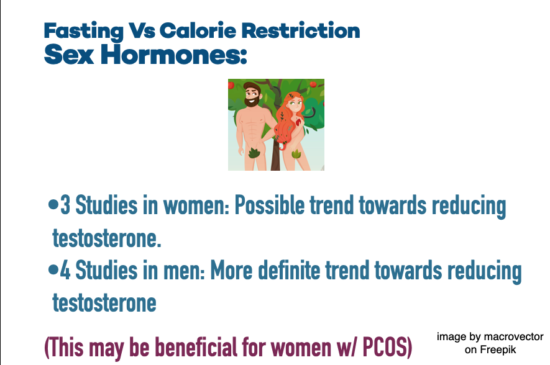
Is Time Restricted Eating Better than Intermittent Fasting for Weight Loss?
As we’ve seen, the weight loss results from fasting are almost identical to weight loss results from standard dieting. Given that there’s no strong reason to recommend one over the other, it’s down to what makes your life easier. The best way to make the choice is to consider your schedule and your social life.
A Potential Problem With Extended Fasts
One recent, little-known study shows that modern body fat is not the same as the body fat of our ancestors. Bizarre-sounding, right? Modern body fat is built by our diet of vegetable oils. Historical body fat was built by an ancestral diet with a radically different fatty acid profile, as I discuss here. If our modern body fat were still the same as historical body fat, fasting might be a safe and potentially powerful weight loss strategy. Unfortunately, modern body fat is very different in terms of its fatty acid composition. This change in fatty acid composition might make it unsafe to fast for extended periods.
Due to this change in fatty acids, modern body fat may not supply healthy fuel to our cells. This, in turn, would radically alter metabolism. In fact, it may make some people feel physically unwell when burning their own body fat! [Click to watch my video presentation on this bizarre and understudied topic]
This change to our body fat chemistry makes it all the more important to look at recent human studies evaluating the safety and effectiveness of fasting.
What’s My Takeaway?
Her’s my summary of the pros and cons of fasting. Its main benefit seems to be simplicity. It gives people the same results as calorie restriction without the hassle of weighing, measuring, recording, and tracking. Its main drawback is it seems not to work for people accustomed to frequent snacking, according to Dr. Varady. This jives with my experience, too.
I’ve discovered that metabolic inflexibility promotes dependence on snacks. If you snack and you want to lose weight, I have a better strategy for you than fasting. It’s super simple: stop snacking. You will probably cut out between 2-500 calories just with that one strategy, and lose as much weight as someone following a 6 to 8-hour time-restricted eating protocol.
But…if you try to cut out snacking and don’t feel well, you may have insulin resistance. You can read more about that here. I have a solution for that, too: Build meals that sustain your appetite using slow-digesting carbohydrates and healthy fats. To learn more about how to do that, you can download my free resources.
If you want to support my work, I wrote a book that walks you through everything you need to know to optimize your metabolic health: The FATBURN Fix. And if you aren’t sure what to do or if any of this is right for you, you can schedule a half-hour consultation with me.
Dr. Varady on Eat Move Think Podcast
Dr. Varaday on Longevity Podcast
Mark Sisson and I Discuss Metabolic Flexibility on The Megyn Kelly Show
IMAGE CREDITS
Featured Image: Total Shape
Link to homepage: https://totalshape.com/
Other images: DrCate.com
Please note: Please do not share personal medical information in a comment on our posts. It will be deleted due to HIPAA regulations.
This Post Has 14 Comments
Note: Please do not share personal information with a medical question in our comment section. Comments containing this content will be deleted due to HIPAA regulations.


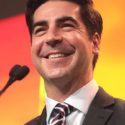













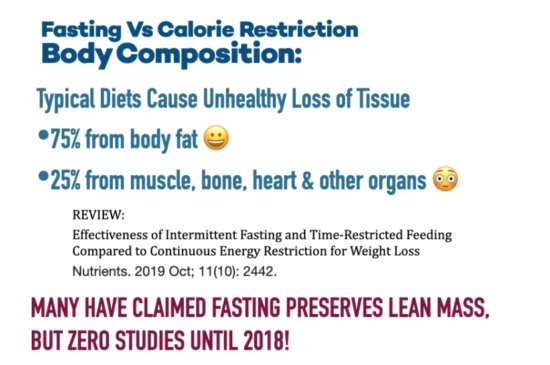

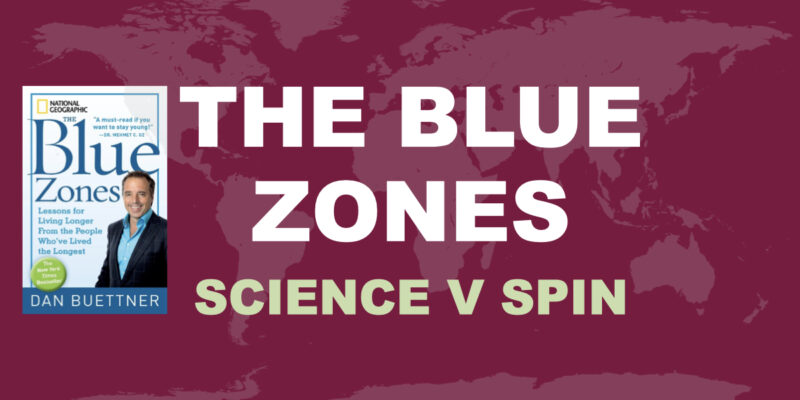

Hey Dr Cate. I hope you are doing well! Could you please elaborate on the use of Mustard oil for cooking purposes? As it is the most common oil used in India Pakistan and Bangladesh. Is it safe to consume?
HI Rabia, please repost this to my Q and A about seed oils page if the answer is not already there 🙂
There is a 3rd way.
A healthy male at 57 years, I started a very effective plan a few years back. I would only eat every 3 hours. If I ate the slightest amount of food, it was another 3 hours before any calories entered my body again. So, when I ate I started to make sure I would last for at least 3 hours. Of course, sometimes the interval was longer if I couldn’t eat or wastn’t hungry. I would also try not to east after 9pm or at least limit my intake. Being a night owl loving to east late at night, that sometimes difficult.
I used the timer on my normal chrono wristwatch to start and reset the timer. That is important because you have a constant visual clue. It is very easy to check the timer when you feel hungry. You notice there is still perhaps ½ hour until the 3 hours have passed. That ½ hour goes by very quickly. You have given your brain piece of mind. You stop to feel hungry. Or it might be 1 hour. Still, it gives you piece of mind. Only 60 minutes until you can eat. No restrictions of content or calories.
I lost between 5-10 kilos in about 2 months time. I had almost no excess fat left and I felt great, not better but the same as before. I tried to limit added sugar intake a bit but kept eating lots of chocolate. But overall, I didn’t really change my relatively healthy diet. Fast food perhaps once a week with the kids. But that’s all. No sodas or crackers. No vegetable oils for cooking. But now 5-6 years later, we avoid the ultraprocessed foods even more.
I have not been able to find studies with this kind of diet. They are all about quite extreme fasting regimes. My theory is that with the 3 hours or more interval between meals, you deplete any insulin in your blood. But I don’t know. I do know that I lost weight, steadily with ‘no pain’. I never weigh myself, never count calories and I was NOT on a diet.
Love,
Elo
I would think the IF group will benefit somewhat from autophagy over the CR, maybe less excess loose skin or other internal effects that would be difficult to study or quantify.
Also when both groups stop dieting would the IFrs suffer the same metabolic slow down as the CR? Hard to determine from the study since during the maintenance phase CR group was restricted to a new calorie baseline and IFrs were not.
Finding and cooking organ meat is difficult for me. What is your opinion of desiccated or freeze-dried organ supplements? If such supplements suffice to replace cooked organ meats, are there any organs I should avoid? Beef Liver, Heart, Kidney, Pancreas, Spleen?
It’s half decent, yep. But a rip-off. If the bottle contains 1 ounce you’re getting 4-5 ounces of liver in the whole deal.
Great article on fasting vs. Calorie restriction. I will read again with more attention to detail tomorrow. It has worked great for me but weight loss has slowed. This somewhat expected as I approach my goal. Especially interested in the lean body and other tissue losses along the way.
I am compiling a list of questions for our next video conference. Almost there just five pounds before we talk and then we can talk about the remaing weight I feel like I need to lose and how to best accomplish it safely.
Thank you for this article on fasting. I agree that the #1 factor affecting the success of any diet is whether or not seed oils are being consumed. I read your book, The FATBURN Fix, after seeing you on a talk show in the summer of 2020. At that time, I had been stuck at 225 lbs for years. I had tried various diets and lost weight but it never stayed off…I would inevitably end up right back at 225. Reading your book changed all that. I immediately got rid of all the seed oils in our house and started cooking with real food. I switched my snack foods from junk food to nuts and cheese, until eventually I didn’t need to snack at all. My husband and I get up every morning and cook a proper breakfast of cheese & veggie omelets, and beef bacon using natural fats like butter and tallow. This sustains us for several hours. Today, my weight is floating around 179 – 180. The weight has come off very slowly (varies from 0-0.4 lbs/day) but it has stayed off. My energy levels are amazing and I feel healthier now than I did in my 20s. Thank you so much, Dr. Cate!
Thank you for reviewing fasting for us, Dr. Cate. I already have your books and weigh 50 pounds less with what I have learned. I also fast. It’s mostly 16 hour fast and 8 hours eating. I have found fasting much easier than calorie restriction. You mentioned, “don’t snack.” Well 16/8 fasting usually means no late night snacking after dinner. 16/8 fasting IS calorie restriction. 16/8 fasting means not snacking or reduced snacking. Certainly one can pig out during those 8 hours, but why would anyone destroy all that they have worked 16 hours for? They don’t.
Examination of diet solutions have shown that calorie restriction (eat less, move more) fails at a greater rate than all other diet solutions. It’s too simple of a solution and it is also the hardest to stick to. For me, I’m sticking with 16/8 fast mixed in with a couple 24-hour fasts and 36 hours fasts. I used those extended fasts to help bring my insulin levels down. I have avoided PUFAs for quite a few years now and life is much better.
Thank you again and best of health to you and your readers.
Glad to hear you’re doing so well! If you get around to reading Phase II of the Fatburn Fix, you’ll see that’s where I talk about implementing fasting.
Thanks for your article on fasting. It may not be good for everyone but it is good for me 🙂 Since 2022, I have one meal per day everyday (+ doing my weight lifting during fasting). I do an extended fast (around 40 to 48 hours) once a month. It really makes me feel good and energetic, and help reset my body after my business travel (when I cannot cook by myself to control any intake of unhealthy ingredients). Thanks again!
I’d love to know about your seed oil habits if you don’t mind sharing 🙂
I was introduced to “The Fatburn Fix” in June 2021 by my sister who had lost 50 lbs. and reversed her diabetes. I bought the book (paper and audible) and read/listened to it…a number of times. It made complete sense to me. I cleaned out my pantry and fridge as I eliminated all foods that contained toxic seed oils, and changed my eating patterns. 20 pounds “fell off” effortlessly in 4 months! And I have kept it off for almost 2 years. Plus – I feel great! I have given the book to many people, hoping they will, at least, rid themselves of those toxic oils. Dr. Cate – I cannot thank you enough for the education you have provided to so many. Your information is invaluable and it’s such a simple way to eat! Thank you! Thank you! Thank you!
Thank you Wendy for sharing your story. I’m so glad you’re doing well!